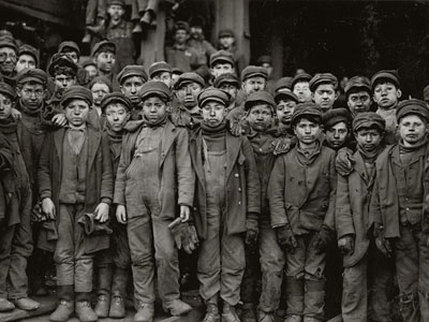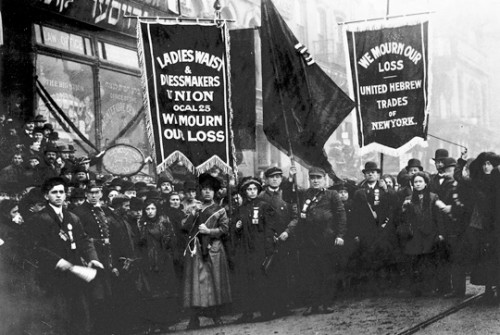By Eleonora di Liscia
Once upon a time, there was an era called the Middle Ages. The Middle Ages were kind of like the teenage years: a bunch of sullen peons having to listen to the dictates of their overlord parents.
In the Middle Ages, wealth and government were basically concentrated in the same hands. Sort of like having a bunch of corporate execs running the government with the CEO as king. But even being a corporate exec had its problems. Just 800 years ago this June, in 1215, a bunch of the execs known as barons, got together and said to the English CEO, King John: “Hey, we’re like the vice presidents here, and we don’t appreciate that when you say, ‘Jump,’ we have to say, ‘How high?’ We want rights!”
As a result, CEO King John was forced to sign Magna Carta, the forerunner of all corporate charters and our system of government.
The Middle Ages continued with the occasional hostile takeover. During one particularly bloody period, known as the Wars of the Romneys, the CEO of England changed seven times, if you count when King Richard sort of disappeared his nephew, the rightful king, thereby inventing vulture capitalism.
Society in the teenage years was based on class. Not the secret-donation-to-charity kind of class, but the I-get-the-Christian Dior; you-get-the-gunny-sack kind of class. You had to be born into power and money, much like if your Dad went to Yale and became President, then you got to go to Yale and become President. Occasionally, a CEO would marry someone out of the steno pool and then decapitate her. But otherwise, you were pretty much stuck in your social stratum.
Eventually, there were these people called Puritans who didn’t want to listen to the CEO about how they worshipped. Instead, they came to America so they could tell other people how to worship.
The really cool thing about America, though, was that your standing in life was no longer based on heredity; it was based on contract, on the relationships you made. You could become a CEO even if you weren’t the son of a CEO! (Unless you were a woman or a slave. But that’s a whole other story.)
So the people running the government did not have to be born CEOs. But history abhors a vacuum, so eventually the CEOs, while not necessarily running the government, decided to do the next best thing and turn their workers into peons.
This meant that workers slaved all day and night; their children slaved all day and night; they didn’t get weekends or any other time off, ever; and they were still really poor while having to listen to people like Ron Paul tell them they weren’t working hard enough. If they got hurt on the job, well, too bad! You should have been more careful and not let those phosphorous matches you work with rot off your jaw.
Eventually the peons thought that something about this situation wasn’t quite right. It wasn’t terribly, well, democratic, and after all they had been taught on television that America was a democracy. They didn’t want to be peons any more than people in the teenage years wanted to be, but unlike people in the teenage years, they could do something about it.
Because in America, the government and the CEOs were not necessarily one and the same. For starters, the peons in the modern age could decide not to go to work. En masse. “Find someone else to make your cheap consumer goods! Ha!” (China was not yet a viable alternative.)
The first American general strike was in Philadelphia in 1835. You see, the carpenters wanted to work only 10 hours a day. As a matter of fact, so would many of our friends today, but we’ll get to that later. The powers that be—in this case the liberal media—felt that less than a 60-hour week would hurt the working man who would have too much time to get into trouble, perhaps creating more employment for DUI attorneys. The carpenters said, “Thanks for your concern, but we’ll take that risk.”
Oddly enough, many other working groups at that time actually showed something called “solidarity.” This means that when one group went on strike, other groups, not having Facebook accounts upon which to “like” the carpenters, thought it might be a good idea to go on strike, too.
In 1842, the Massachusetts Supreme Court in Commonwealth v. Hunt came to an amazing realization. The court woke up one day and said, “By golly, we’re not in England anymore!” Therefore, the English common law, which made “combinations” to increase wages illegal, need not apply. Thus, forming a union to increase wages was not an illegal conspiracy in the U.S. To which we say, it’s about time!
In 1866, the first national labor federation was formed, the National Labor Union, the daddy of groups like the AFL-CIO. Not satisfied with a slothful 10-hour day, the NLU pushed for eight hours—even more time off for working people to get into trouble and line the pockets of DUI attorneys.
In 1909, the women of the Triangle Shirtwaist Factory went on strike. Why? Nitpicky complaints about working conditions. Like being locked into a poorly ventilated workroom 65-75 hours a week at low wages while having to buy their own supplies and equipment. The women were fined if they were tardy or damaged a garment. Sometimes they were fined more than they made and went into debt to their employers. And the women actually had to ask permission to use the restroom, as breaks were only allowed once a day. Often, these requests were denied, forcing the women to pee on the floor. Such working conditions are now known as “Gov. Scott Walker’s dream universe.”
In 1932, Congress passed the Norris-LaGuardia Act, which protected workers’ rights to form a union by barring employers from requiring workers to sign a pledge not to form a union on pain of execution. This breakthrough was followed by the Wagner Act, or National Labor Relations Act, which further protected unions and set up the National Labor Relations Board (NLRB). The NLRB gave workers a place to go if their employers were really, really mean, which is sometimes called an “unfair labor practice.”
In 1971, the Occupational Safety and Health Act was signed by radical left-wing President Richard Nixon. OSHA was intended to help those persnickety workers who were making a fuss about breathing toxic chemicals all day or losing a limb or torso to faulty equipment.
All these reforms came at a price. People were beaten, even killed, while fighting for the right to earn a decent wage without having to pee on the workroom floor. In the 1913 Ludlow Massacre, 20 people, among them 13 women and children, were massacred during a coal miners’ strike. It took unions, and eventually government, to balance the power of the CEOs and make the world just a little more fair.
And what about our friends who are working those 10-hour plus days today? Well, thanks in part to the Supreme Court’s Citizens United decision, the corporate execs are taking over the government (hello, Bruce Rauner!), dismantling the unions, and undermining labor laws.
Here is the part where we say “all kidding aside.” All kidding aside, do we want to go back to the teenage years? Because, all kidding aside, that’s where we’re headed.
A recent Last Week Tonight with John Oliver reported that 98 percent of our clothes are made overseas. To maintain their huge profits, clothing outfitters use overseas sweatshops mirroring many of the same conditions that led to the Triangle Shirtwaist strike. Conditions at a Chinese sweatshop making Apple products were so bad that nets had to be placed around a building to catch suicidal workers.
Think how much more profitable these companies would be if they could save those overseas shipping costs by using forced labor at home!
What stops these companies is our unions and our labor laws. For example, the Washington State Department of Labor and Industries website reported that “Working families lose billions of dollars to wage theft each year, when crooked employers fail to pay legal minimum wages or overtime rates, require off-the-clock work, or simply bounce checks.” Our state’s Attorney General recently filed criminal charges against one such employer.
Republicans want to go back to the teenage years, running their corporations without annoying union or government interference. Why, Wisconsin Republicans have introduced a bill to abolish an employee’s right to have at least one day off a week.
For most of us, the teenage years were a bummer. Let’s not relive them.


